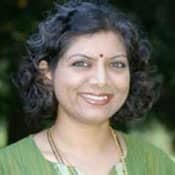Most people know about ahimsa—the concept of non-violence in thought/word/deed that Gandhi made famous. There is a Hindu verse that most people only quote half of: Ahimsa paramo dharmah, Dharma himsa tathaiva chah—Non-violence is the ultimate Dharma. So too is violence in service of Dharma. So Lieutenant Rajiv Srinivasan's perspective—a Hindu inspired by his faith to fight for what he believes in—is dharmic, or in a really simple English translation, just.
In his Hindu American Foundation's award winning NextGen essay, "My Battle Within: The Identity Crisis of a Hindu Soldier in the US Army," Rajiv talks of his quest for identity, the conflict of being both Indian and American. A graduate of the U.S. Military Academy at West Point, he explains how he asked himself, "How can I serve patriotically as a U.S. Army Officer, owning the responsibility of waging war against our national enemies, but remain a man of the Hindu faith believing in the peaceful coexistence of all beings?" He speaks of defending values where efforts to reconcile peacefully fail, and defending the moral foundations that have made this country a haven for religious and ethnic tolerance. He finds solace in the Hindu holy book, the Bhagavad Gita. He challenges other Hindu Americans to find a calling: "inspired by our faith, we must actively rebuild our nation's character and preserve it for our posterity."
I recently heard these words from the lips of another young Hindu American, Parth Shukla, whose eyes light up when he talks of Rajiv and the essay. I heard Parth reference the essay when I visited his home; his parents are both co-founders of the Hindu American Foundation, a young advocacy organization for the Hindu American community. The significant current event unfolding during my visit was the U.S. involvement in Operation Odyssey Dawn—the international military operation in Libya by a coalition that is enforcing United Nations Security Council Resolution 1973—an engagement that has me questioning the character of my nation and the direction we are going in. The sparkle in Parth's eyes when he spoke of Rajiv, and how he too wants to defend this country made me wonder: what values or moral foundations are we actually defending when we engage in such military action? Is this a just war? Like Rajiv, I turned to the Bhagavad Gita.
The Bhagavad Gita (Song of God) chronicles the struggle of Arjuna, and the conversation between Arjuna and Krishna on the edge of the battlefield of the Mahabharata, the great war between two feuding families, the Kauravas and the Pandavas. In the introduction to one of my favorite translations (a highly popular and poetic translation by the late Juan Mascaro, a scholar from Majorca, who first went to Cambridge and then to what is now Sri Lanka), Mascaro says,
Greece and India give us complementary views of the world. In the Greek temple we find the clear perfection of beauty: in the Indian temple we find the sublime sense of Infinity. Greece gives us the joy of eternal beauty in the outer world; and India gives us the joy of the Infinite in the inner world. . . . Whilst the war in the Mahabharata may be meant as a real war it is obvious that the war in the Bhagavad Gita has a symbolic meaning . . . We find in the Gita that there is going to be a great battle for the rule of a Kingdom; and how can we doubt that this is the Kingdom of Heaven, the kingdom of the soul?
Even while war imagery is used, the Gita tells us that the highest yoga is ahimsa. At the end of Chapter 3, Krishna says that we should "be a warrior and kill desire, the powerful enemy of the soul," and again at the end of Chapter 4, "Kill therefore with the sword of wisdom the doubt born of ignorance that lies in thy heart."
Like ahimsa, removing one's ignorance is another key Hindu teaching. I realized how ignorant I was of another side of U.S. history when I first read the late historian and activist Howard Zinn's classic, A People's History of the United States. In Zinn's first speech after the 2008 election, "War and Social Justice," given at Binghamton University in New York, he said,
We can be a humanitarian superpower. We can—yeah. We'll still be powerful. We'll still be rich. But we can use that power and that wealth to help people all over the world. I mean, instead of sending helicopters to bomb people, send helicopters when they face a hurricane or an earthquake and they desperately need helicopters. You know, you know. So, yeah, there's a lot of money available once you seriously fundamentally change the foreign policy of the United States.





